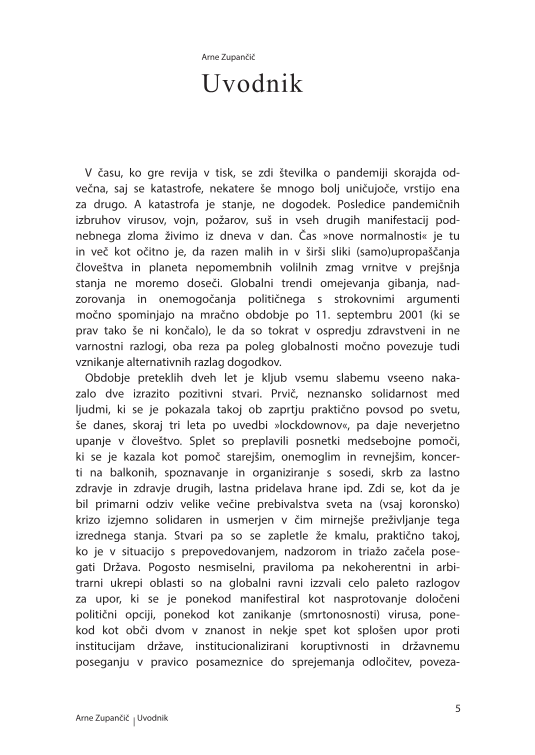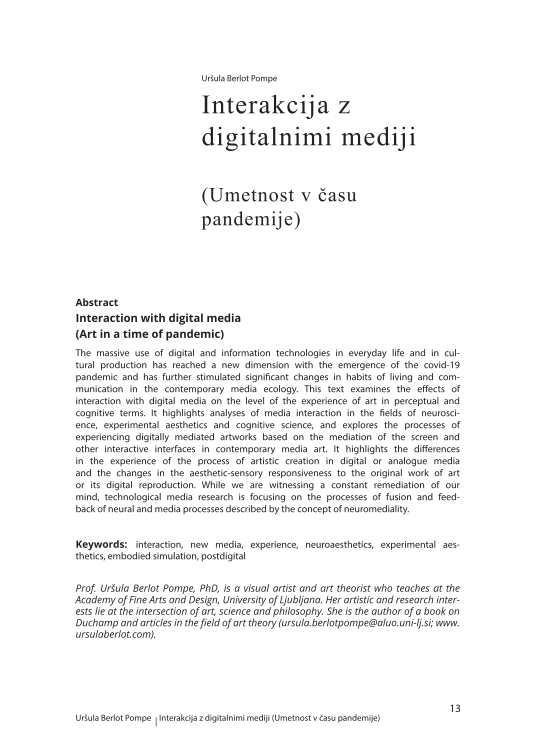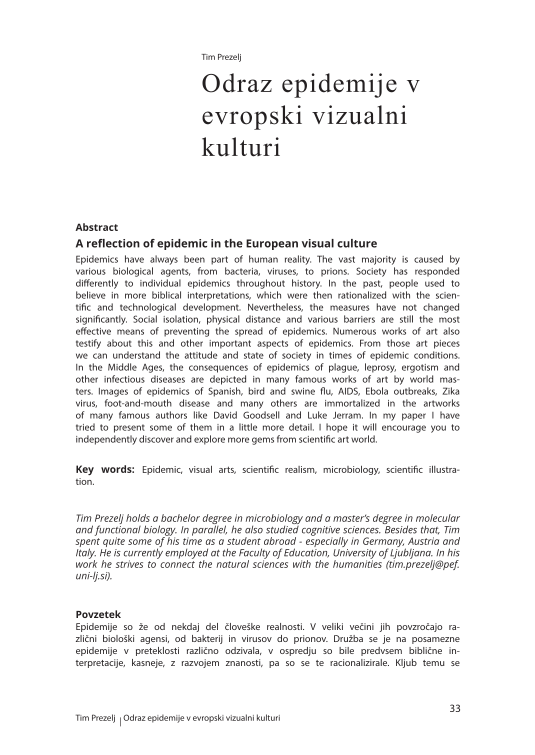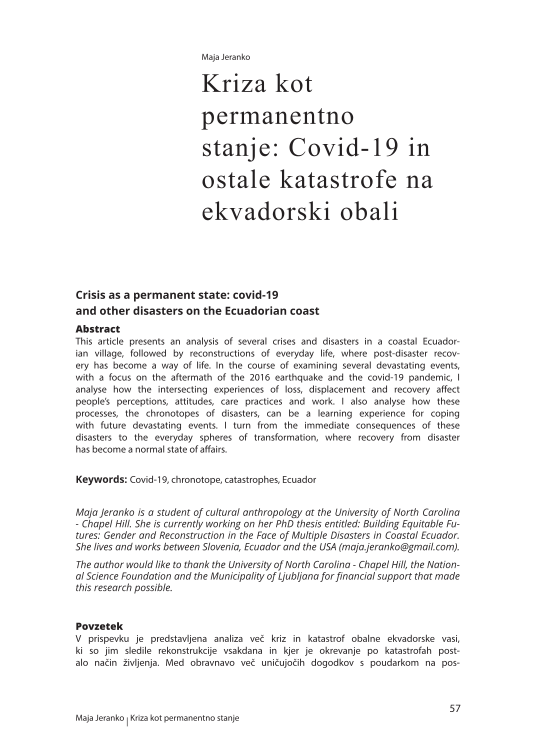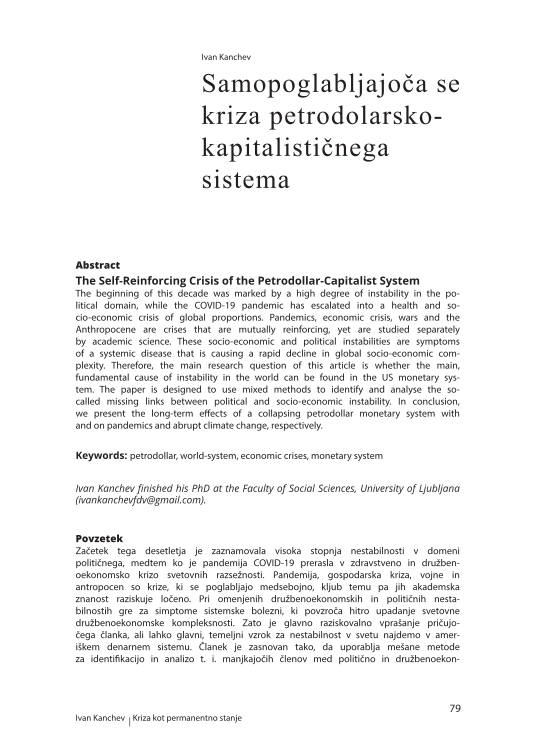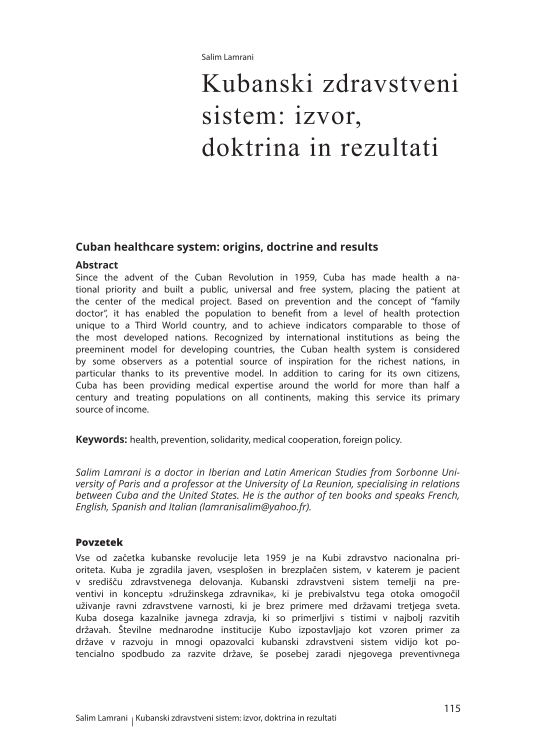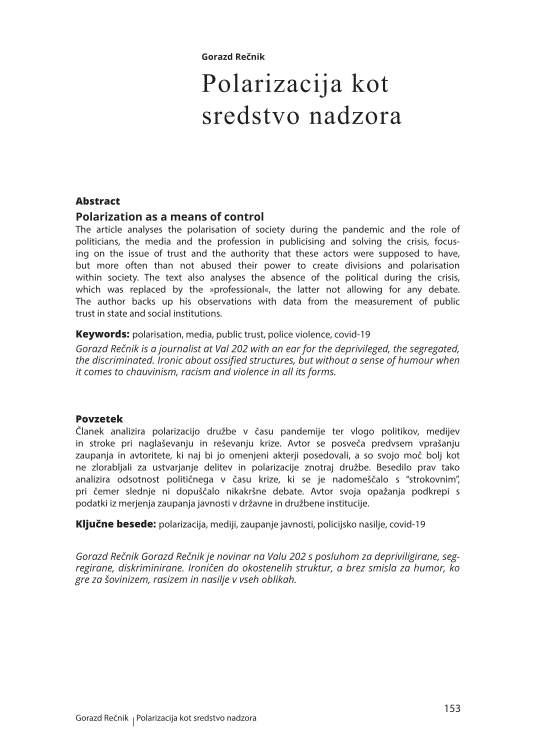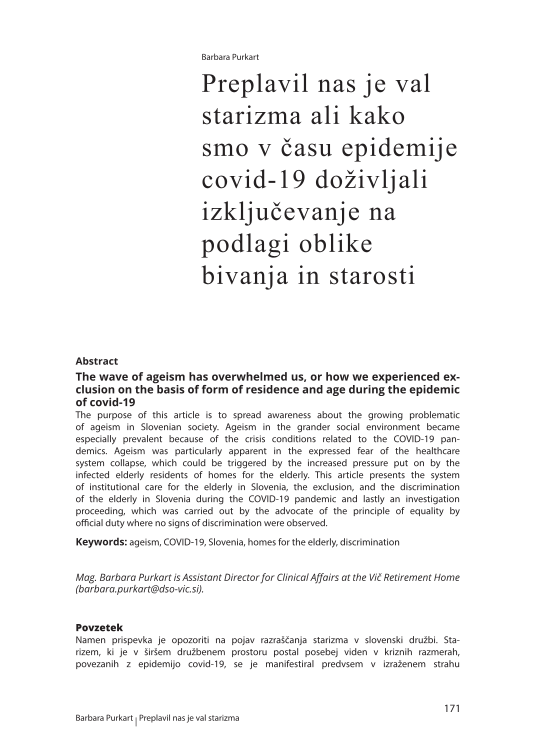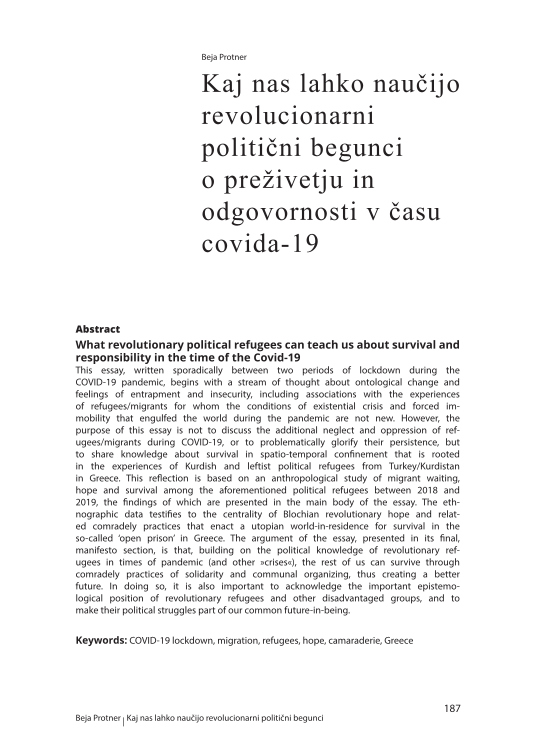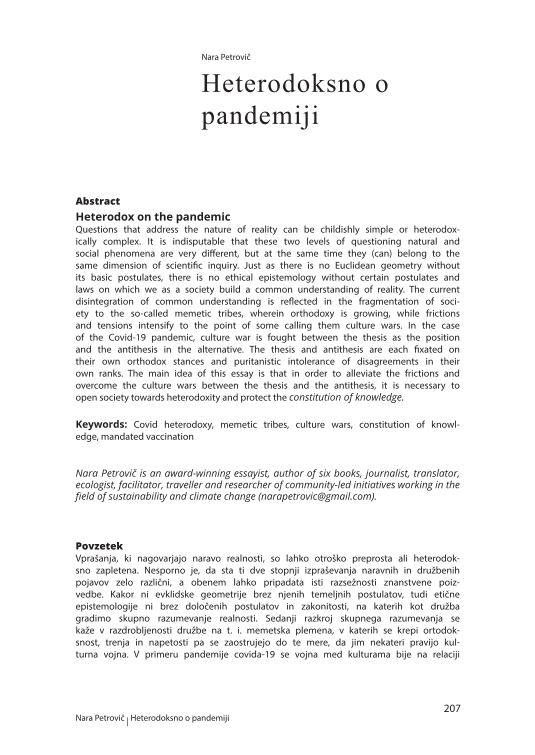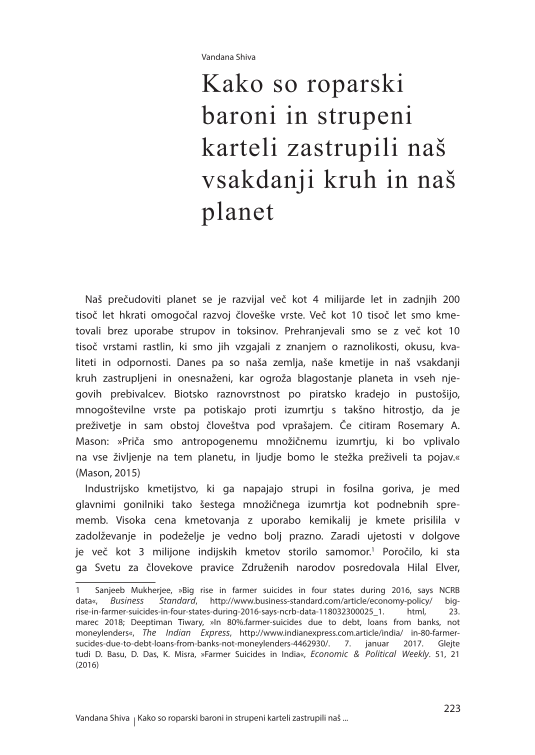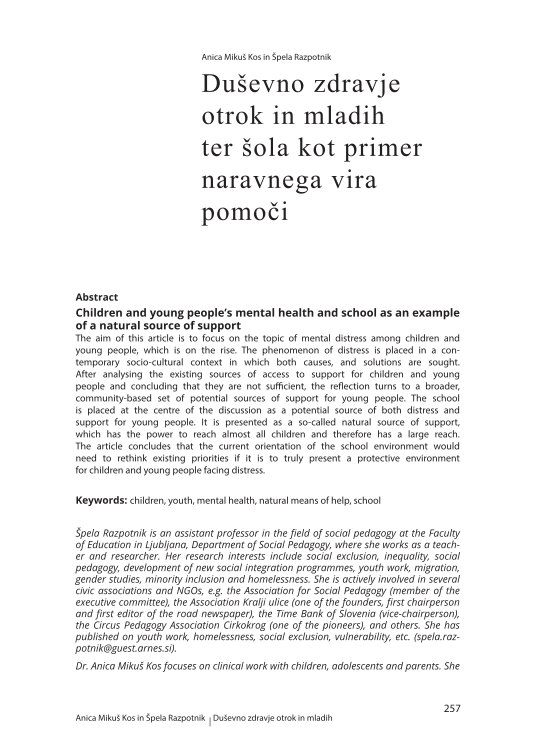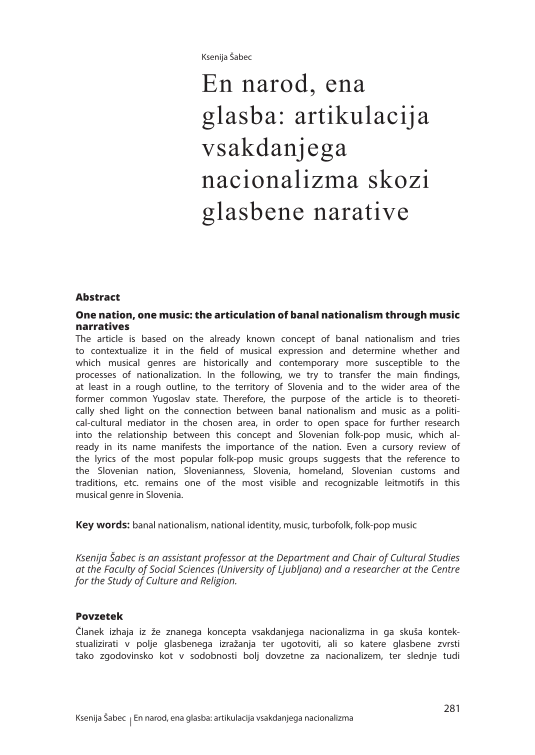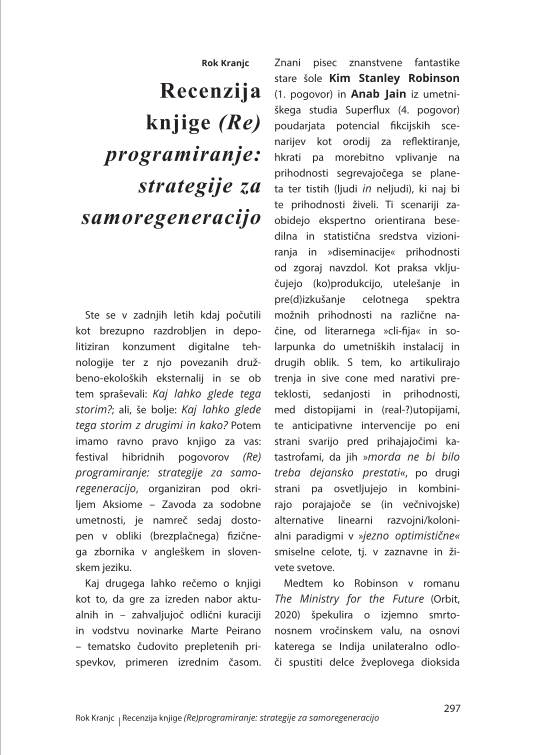V času, ko gre revija v tisk, se zdi številka o pandemiji skorajda odvečna, saj se katastrofe, nekatere še mnogo bolj uničujoče, vrstijo ena za drugo. A katastrofa je stanje, ne dogodek. Posledice pandemičnih izbruhov virusov, vojn, požarov, suš in vseh drugih manifestacij podnebnega zloma živimo iz dneva v dan. Čas »nove normalnosti« je tu in več kot očitno je, da razen malih in v širši sliki (samo)upropaščanja človeštva in planeta nepomembnih volilnih zmag vrnitve v prejšnja stanja ne moremo doseči. Globalni trendi omejevanja gibanja, nadzorovanja in onemogočanja političnega s strokovnimi argumenti močno spominjajo na mračno obdobje po 11. septembru 2001 (ki se prav tako še ni končalo), le da so tokrat v ospredju zdravstveni in ne varnostni razlogi, oba reza pa poleg globalnosti močno povezuje tudi vznikanje alternativnih razlag dogodkov.
The massive use of digital and information technologies in everyday life and in cultural production has reached a new dimension with the emergence of the covid-19 pandemic and has further stimulated significant changes in habits of living and communication in the contemporary media ecology. This text examines the effects of interaction with digital media on the level of the experience of art in perceptual and cognitive terms. It highlights analyses of media interaction in the fields of neuroscience, experimental aesthetics and cognitive science, and explores the processes of experiencing digitally mediated artworks based on the mediation of the screen and other interactive interfaces in contemporary media art. It highlights the differences in the experience of the process of artistic creation in digital or analogue media and the changes in the aesthetic-sensory responsiveness to the original work of art or its digital reproduction. While we are witnessing a constant remediation of our mind, technological media research is focusing on the processes of fusion and feedback of neural and media processes described by the concept of neuromediality.
Epidemics have always been part of human reality. The vast majority is caused by various biological agents, from bacteria, viruses, to prions. Society has responded differently to individual epidemics throughout history. In the past, people used to believe in more biblical interpretations, which were then rationalized with the scientific and technological development. Nevertheless, the measures have not changed significantly. Social isolation, physical distance and various barriers are still the most effective means of preventing the spread of epidemics. Numerous works of art also testify about this and other important aspects of epidemics. From those art pieces we can understand the attitude and state of society in times of epidemic conditions. In the Middle Ages, the consequences of epidemics of plague, leprosy, ergotism and other infectious diseases are depicted in many famous works of art by world masters. Images of epidemics of Spanish, bird and swine flu, AIDS, Ebola outbreaks, Zika virus, foot-and-mouth disease and many others are immortalized in the artworks of many famous authors like David Goodsell and Luke Jerram. In my paper I have tried to present some of them in a little more detail. I hope it will encourage you to independently discover and explore more gems from scientific art world.
This article presents an analysis of several crises and disasters in a coastal Ecuadorian village, followed by reconstructions of everyday life, where post-disaster recovery has become a way of life. In the course of examining several devastating events, with a focus on the aftermath of the 2016 earthquake and the covid-19 pandemic, I analyse how the intersecting experiences of loss, displacement and recovery affect people’s perceptions, attitudes, care practices and work. I also analyse how these processes, the chronotopes of disasters, can be a learning experience for coping with future devastating events. I turn from the immediate consequences of these disasters to the everyday spheres of transformation, where recovery from disaster has become a normal state of affairs.
The beginning of this decade was marked by a high degree of instability in the political domain, while the COVID-19 pandemic has escalated into a health and socio-economic crisis of global proportions. Pandemics, economic crisis, wars and the Anthropocene are crises that are mutually reinforcing, yet are studied separately by academic science. These socio-economic and political instabilities are symptoms of a systemic disease that is causing a rapid decline in global socio-economic complexity. Therefore, the main research question of this article is whether the main, fundamental cause of instability in the world can be found in the US monetary system. The paper is designed to use mixed methods to identify and analyse the so-called missing links between political and socio-economic instability. In conclusion, we present the long-term effects of a collapsing petrodollar monetary system with and on pandemics and abrupt climate change, respectively.
Since the advent of the Cuban Revolution in 1959, Cuba has made health a national priority and built a public, universal and free system, placing the patient at the center of the medical project. Based on prevention and the concept of “family doctor”, it has enabled the population to benefit from a level of health protection unique to a Third World country, and to achieve indicators comparable to those of the most developed nations. Recognized by international institutions as being the preeminent model for developing countries, the Cuban health system is considered by some observers as a potential source of inspiration for the richest nations, in particular thanks to its preventive model. In addition to caring for its own citizens, Cuba has been providing medical expertise around the world for more than half a century and treating populations on all continents, making this service its primary source of income.
The article analyses the polarisation of society during the pandemic and the role of politicians, the media and the profession in publicising and solving the crisis, focusing on the issue of trust and the authority that these actors were supposed to have, but more often than not abused their power to create divisions and polarisation within society. The text also analyses the absence of the political during the crisis, which was replaced by the »professional«, the latter not allowing for any debate. The author backs up his observations with data from the measurement of public trust in state and social institutions.
The purpose of this article is to spread awareness about the growing problematic of ageism in Slovenian society. Ageism in the grander social environment became especially prevalent because of the crisis conditions related to the COVID-19 pandemics. Ageism was particularly apparent in the expressed fear of the healthcare system collapse, which could be triggered by the increased pressure put on by the infected elderly residents of homes for the elderly. This article presents the system of institutional care for the elderly in Slovenia, the exclusion, and the discrimination of the elderly in Slovenia during the COVID-19 pandemic and lastly an investigation proceeding, which was carried out by the advocate of the principle of equality by official duty where no signs of discrimination were observed.
What revolutionary political refugees can teach us about survival and responsibility in the time of the Covid-19
(
This essay, written sporadically between two periods of lockdown during the COVID-19 pandemic, begins with a stream of thought about ontological change and feelings of entrapment and insecurity, including associations with the experiences of refugees/migrants for whom the conditions of existential crisis and forced immobility that engulfed the world during the pandemic are not new. However, the purpose of this essay is not to discuss the additional neglect and oppression of refugees/migrants during COVID-19, or to problematically glorify their persistence, but to share knowledge about survival in spatio-temporal confinement that is rooted in the experiences of Kurdish and leftist political refugees from Turkey/Kurdistan in Greece. This reflection is based on an anthropological study of migrant waiting, hope and survival among the aforementioned political refugees between 2018 and 2019, the findings of which are presented in the main body of the essay. The ethnographic data testifies to the centrality of Blochian revolutionary hope and related comradely practices that enact a utopian world-in-residence for survival in the so-called ‘open prison’ in Greece. The argument of the essay, presented in its final, manifesto section, is that, building on the political knowledge of revolutionary refugees in times of pandemic (and other »crises«), the rest of us can survive through comradely practices of solidarity and communal organizing, thus creating a better future. In doing so, it is also important to acknowledge the important epistemological position of revolutionary refugees and other disadvantaged groups, and to make their political struggles part of our common future-in-being.
Questions that address the nature of reality can be childishly simple or heterodoxically complex. It is indisputable that these two levels of questioning natural and social phenomena are very different, but at the same time they (can) belong to the same dimension of scientific inquiry. Just as there is no Euclidean geometry without its basic postulates, there is no ethical epistemology without certain postulates and laws on which we as a society build a common understanding of reality. The current disintegration of common understanding is reflected in the fragmentation of society to the so-called memetic tribes, wherein orthodoxy is growing, while frictions and tensions intensify to the point of some calling them culture wars. In the case of the Covid-19 pandemic, culture war is fought between the thesis as the position and the antithesis in the alternative. The thesis and antithesis are each fixated on their own orthodox stances and puritanistic intolerance of disagreements in their own ranks. The main idea of this essay is that in order to alleviate the frictions and overcome the culture wars between the thesis and the antithesis, it is necessary to open society towards heterodoxity and protect the constitution of knowledge.
Naš prečudoviti planet se je razvijal več kot 4 milijarde let in zadnjih 200 tisoč let hkrati omogočal razvoj človeške vrste. Več kot 10 tisoč let smo kmetovali brez uporabe strupov in toksinov. Prehranjevali smo se z več kot 10 tisoč vrstami rastlin, ki smo jih vzgajali z znanjem o raznolikosti, okusu, kvaliteti in odpornosti. Danes pa so naša zemlja, naše kmetije in naš vsakdanji kruh zastrupljeni in onesnaženi, kar ogroža blagostanje planeta in vseh njegovih prebivalcev. Biotsko raznovrstnost po piratsko kradejo in pustošijo, mnogoštevilne vrste pa potiskajo proti izumrtju s takšno hitrostjo, da je preživetje in sam obstoj človeštva pod vprašajem. Če citiram Rosemary A. Mason: »Priča smo antropogenemu množičnemu izumrtju, ki bo vplivalo na vse življenje na tem planetu, in ljudje bomo le stežka preživeli ta pojav.« (Mason, 2015)
Children and young people’s mental health and school as an example of a natural source of support
(
The aim of this article is to focus on the topic of mental distress among children and young people, which is on the rise. The phenomenon of distress is placed in a contemporary socio-cultural context in which both causes, and solutions are sought. After analysing the existing sources of access to support for children and young people and concluding that they are not sufficient, the reflection turns to a broader, community-based set of potential sources of support for young people. The school is placed at the centre of the discussion as a potential source of both distress and support for young people. It is presented as a so-called natural source of support, which has the power to reach almost all children and therefore has a large reach. The article concludes that the current orientation of the school environment would need to rethink existing priorities if it is to truly present a protective environment for children and young people facing distress.
The article is based on the already known concept of banal nationalism and tries to contextualize it in the field of musical expression and determine whether and which musical genres are historically and contemporary more susceptible to the processes of nationalization. In the following, we try to transfer the main findings, at least in a rough outline, to the territory of Slovenia and to the wider area of the former common Yugoslav state. Therefore, the purpose of the article is to theoretically shed light on the connection between banal nationalism and music as a political-cultural mediator in the chosen area, in order to open space for further research into the relationship between this concept and Slovenian folk-pop music, which already in its name manifests the importance of the nation. Even a cursory review of the lyrics of the most popular folk-pop music groups suggests that the reference to the Slovenian nation, Slovenianness, Slovenia, homeland, Slovenian customs and traditions, etc. remains one of the most visible and recognizable leitmotifs in this musical genre in Slovenia.
Ste se v zadnjih letih kdaj počutili kot brezupno razdrobljen in depolitiziran konzument digitalne tehnologije ter z njo povezanih družbeno-ekoloških eksternalij in se ob tem spraševali: Kaj lahko glede tega storim?; ali, še bolje: Kaj lahko glede tega storim z drugimi in kako? Potem imamo ravno pravo knjigo za vas: festival hibridnih pogovorov (Re)programiranje: strategije za samoregeneracijo, organiziran pod okriljem Aksiome – Zavoda za sodobne umetnosti, je namreč sedaj dostopen v obliki (brezplačnega) fizičnega zbornika v angleškem in slovenskem jeziku.
Kaj drugega lahko rečemo o knjigi kot to, da gre za izreden nabor aktualnih in – zahvaljujoč odlični kuraciji in vodstvu novinarke Marte Peirano – tematsko čudovito prepletenih prispevkov, primeren izrednim časom. Znani pisec znanstvene fantastike stare šole Kim Stanley Robinson (1. pogovor) in Anab Jain iz umetniškega studia Superflux (4. pogovor) poudarjata potencial fikcijskih scenarijev kot orodij za reflektiranje, hkrati pa morebitno vplivanje na prihodnosti segrevajočega se planeta ter tistih (ljudi in neljudi), ki naj bi te prihodnosti živeli. Ti scenariji zaobidejo ekspertno orientirana besedilna in statistična sredstva vizioniranja in »diseminacije« prihodnosti od zgoraj navzdol. Kot praksa vključujejo (ko)produkcijo, utelešanje in pre(d)izkušanje celotnega spektra možnih prihodnosti na različne načine, od literarnega »cli-fija« in solarpunka do umetniških instalacij in drugih oblik. S tem, ko artikulirajo trenja in sive cone med narativi preteklosti, sedanjosti in prihodnosti, med distopijami in (real-?)utopijami, te anticipativne intervencije po eni strani svarijo pred prihajajočimi katastrofami, da jih »morda ne bi bilo treba dejansko prestati«, po drugi strani pa osvetljujejo in kombinirajo porajajoče se (in večnivojske) alternative linearni razvojni/kolonialni paradigmi v »jezno optimistične« smiselne celote, tj. v zaznavne in živete svetove.




